Climate Justice: Addressing Historic Inequities & Rising Emissions
The theme of climate justice runs throughout Global Optimism’s Outrage + Optimism podcast episodes. We talk with some of the leading change-makers confronting the range of socioeconomic, gender, racial and intergenerational injustices that are exacerbated by the climate crisis, examining the historical and ongoing inequalities that lie at the heart of the impacts of climate change, but can also be remedied when the transition to a clean economy, free from fossil fuels, are applied with foresight.
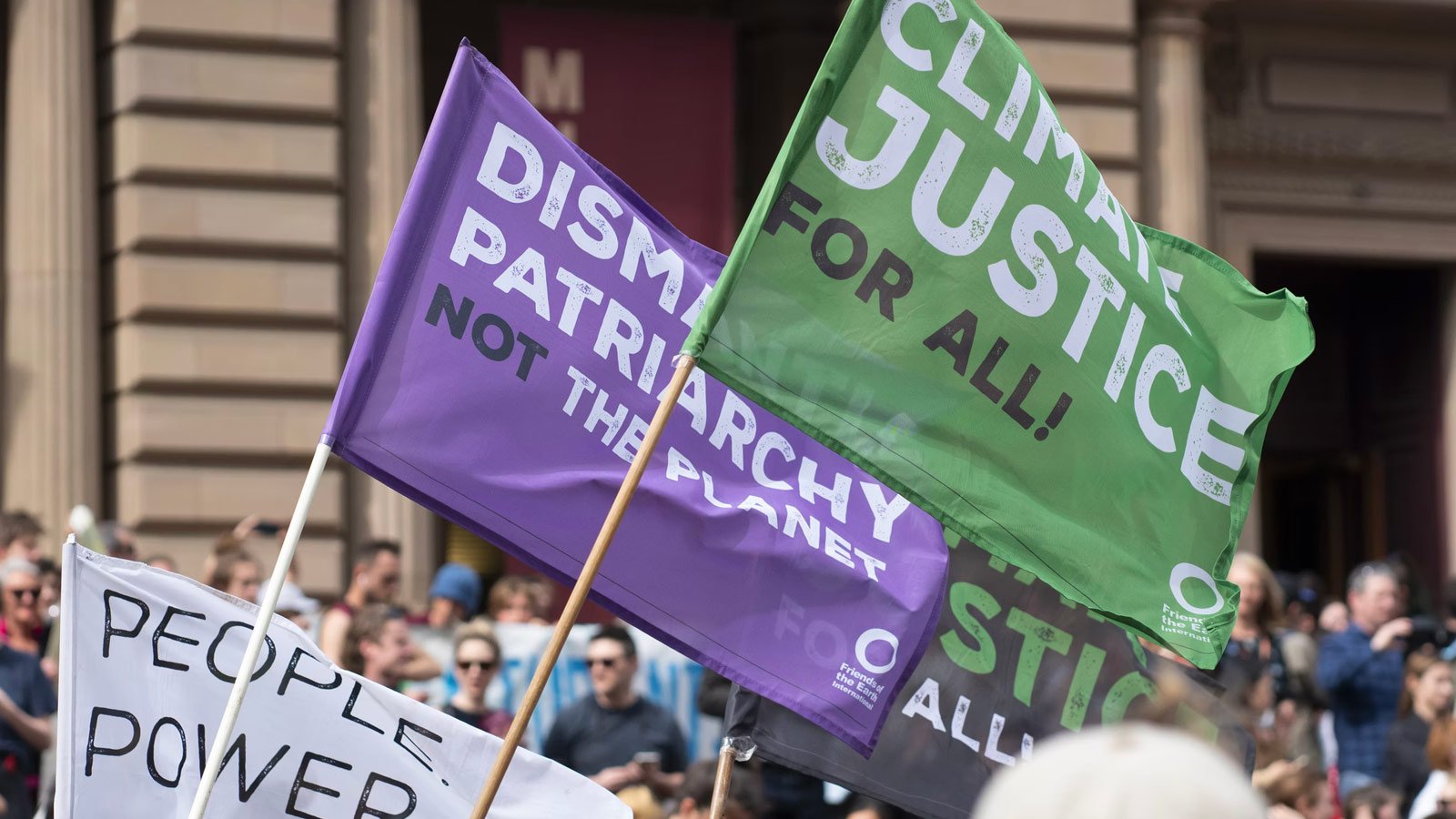
From the historic drought threatening millions in Southern Africa to a pair of hurricanes that dealt a severe blow to several Central American countries in 2020—including impoverished communities in Honduras—and the millions of Black and Brown Americans exposed to dangerous levels of toxic air pollution daily, climate threats have intensified deep inequities in societies around the world.
No country or community is immune to the interwoven challenges of inequality and climate change—these exist between countries and within societies. What is indisputable is that climate change is experienced unevenly, with the most vulnerable impacted most profoundly.
Since the Industrial Revolution, almost all nations have developed their economies with a heavy reliance on fossil fuels. This prompted the development of technologies that let us travel easily, build increasingly larger cities and allowed us to run our homes, hospitals, main streets and factories. But whilst many people across the generations have benefitted, a looming crisis has been building. Scientific consensus is clear that the past 150 years of development in industrialised nations—so-called “human induced activity”—associated with burning fossil fuels has resulted in greenhouse gases accumulating in the atmosphere, resulting in more than 1.1 degrees Celsius of irreversible warming.
Poorer nations have been disproportionately affected by climate change despite their comparatively low footprint. Burning fossil fuels in one location emits dangerous gases including carbon into the global atmosphere, affecting communities far away from the source of the emissions. In other words, those who are least responsible for causing the problem are often hardest hit by the negative impacts of a changing climate. This is not only an environmental problem: the principles of climate justice recognise the inextricably linked economic and social costs associated with climate change.
“The burning of fossil fuels is killing us,” the World Health Organization (WHO) wrote in a special report ahead of COP26 in Glasgow, which recommends putting health and social justice at the center of UN climate discussions. “Climate change is the single biggest health threat facing humanity. While no one is safe from the health impacts of climate change, they are disproportionately felt by the most vulnerable and disadvantaged.”
On a macro level, society is to blame for the inequities exacerbated by the climate crisis. It’s why, for example, Americans living in areas that were formerly impacted by racist housing policies experience warmer days than non-segregated communities, fueling the so-called “urban heat-island effect.” Or how Black residents in the United Kingdom are more likely to be exposed to illegal levels of air pollution.
Governments and human rights organisations are increasingly using the term “climate justice” to describe the unequal impacts of climate change on disadvantaged or vulnerable groups and communities, advocating for ambitious solutions to address the interlinked issues of economic, racial and gender inequality, and for more support to developing countries.
Climate justice—or environmental justice—is not a new concept, but it's one that has gained momentum in recent years, partly due to diverse, youth-led movements. Activists, whose lives have been profoundly shaped by post-9/11 wars, the accelerating climate crisis, political upheaval, and ongoing racial reckoning, say that intersectionality is key to addressing some of society’s thorniest challenges. For them, climate justice and prioritising equity is the way to go about addressing the energy and social transitions that are necessary during the 2020s.
In that spirit, the Sunrise Movement in the United States describes the Green New Deal as “the only plan put forward to address the interwoven crises of climate catastrophe, economic inequality, and racism at the scale that science and justice demand.” The GND serves as a comprehensive blueprint to building equity and better lives—while also reducing greenhouse gas emissions and transitioning to clean energy. To many this may sound idealistic, but in Europe, the EU parliament which includes representatives of 27 countries –with many different ideologies – have committed to a Green Deal at the heart of the bloc’s economic recovery and commitment to achieve their obligations under the Paris Agreement on climate change. In fact, across the developed world, there seems to be a ‘greening’ of politics as millennials and Gen Z become the voting class.
If we are to meet the 2015 Paris Agreement’s legally binding target of reducing greenhouse gas emissions to net zero by 2050, to avoid global temperature rise exceeding the 1.5 degrees Celsius (2.7 degrees Fahrenheit) threshold—beyond which dangers become more extreme and unpredictable—climate justice will have to play a central role. This means rethinking large urban areas, including cars, buses, trucks and infrastructure we need for transportation, protecting nature through the practices we use for agriculture and restoring degraded lands and waters, to improving healthcare in low-income communities choked by hazardous air pollution, and investing in well-paying, clean-energy jobs.
As the United Nations states: “The impacts of climate change will not be borne equally or fairly, between rich and poor, women and men, and older and younger generations. Consequently, there has been a growing focus on climate justice, which looks at the climate crisis through a human rights lens and on the belief that by working together we can create a better future for present and future generations.”
With that in mind, let’s explore climate justice and what needs to happen politically and culturally to better protect vulnerable populations.
In a series of episodes on Outrage + Optimism, we’ve discussed the growing calls for climate justice from young leaders and older generations. This article examines these persistent inequities and their relation to the climate crisis.
To learn more about these and other issues, subscribe to the Outrage + Optimism podcast on your favourite podcast app.
What Is Climate Justice?
Climate justice is an umbrella term used to describe the many ways we need to go about redressing a wide range of societal injustices that have contributed to negative outcomes for the most vulnerable communities, and how these inequalities are exacerbated by the climate crisis.
Isra Hirsi, executive director of the U.S. Youth Climate Strike, tells Outrage + Optimism that climate is “the massive overarching issue that everything fits under. I don't think this climate conversation is specific to just the trees or the environment. It's specific to everything. And I think when we talk about things like racial equity, or we talk about the patriarchy or colonialism, all these things fit under climate change and the climate crisis.”
Urgent calls for climate justice followed the murder of African American George Floyd by a Minneapolis police officer in May 2020. The 46-year-old’s brutal killing sparked tens of millions of people across the globe to protest and demand change, with community leaders stressing action on policing, healthcare, education, and the environment.
Before that, racial justice groups organised to call attention to the water crisis in Flint, Michigan—a majority minority community suffering from years of lead-contaminated water. In the United States, the environmental justice movement is considered an extension of the larger Civil Rights struggle. Indeed, during a speech a decade ago, then-US Attorney General Eric Holder said Rev. Dr Martin Luther King, Jr. “helped to plant the seeds for what would become our nation’s now-thriving environmental justice movement,” referring to King’s support of sanitation workers in Memphis, Tennessee in 1968.
“The underlying conditions that are driving all of this anger and frustration we’re seeing are systemic. All these different threats are converging with Black Lives Matter,” says Robert Bullard, a Distinguished Professor of Urban Planning and Environmental Policy at Texas Southern University, and longtime environmental justice advocate.
“The fact that Blacks are killed by police, that we’re dying of COVID at twice the rate of whites, that our communities have the toxic dumps, that the rollbacks of environmental regulations and protections will affect our communities disproportionately—these issues are part of the same underlying structures that we need to dismantle. How are environmental rollbacks a racial justice issue? We live with them 24/7.”
In an open letter to world leaders dated 11 October 2021, a coalition of Indigenous, human rights and environmental organizations wrote about the urgent need for a humanitarian response to the climate crisis, citing a wide range of injustices, including land grabs, loss of food and water sovereignty, increased poverty, and more.
“The costs of both environmental destruction and measures to address this often fall disproportionately on those already in precarious positions—such as indigenous peoples, afro-descendants, local communities, women, children and youths, and poorly-paid workers, particularly in the Global South but also in the Global North–while the profits of the largest and most environmentally-damaging industries, and the wealth of their owners and financers, continues to grow,” the groups wrote. “It is unforgivable that polluting industries profit at the expense of the health and human rights of marginalised communities. And, ultimately, this environmental destruction has indirect human rights impacts on us all.”
Big, bold ideas are needed to create safer environments for everyone—communities free of toxic air pollution, neighbourhoods surrounded by more tree canopy to alleviate extreme heat, improved and more accessible healthcare so people don’t die from rising temperatures or lung illnesses caused by pollution.
The environmentalist Bill McKibben, often credited with helping global warming enter the mainstream, wrote in the book “Winning The Green New Deal”:
“[I]f we want to address one of the two great disasters of our time, the spiking temperature, then we have to address the other as well—the spiking levels of inequality. They both loom so large that they can't be taken on piecemeal: if you accept the argument that we need dramatic change to deal with the climate crisis, then there's no way to get change on that scale without simultaneously addressing the economic insecurity that makes it so hard for people to imagine change.”
Youth Movements & Climate Justice
For younger generations across the globe, there’s no issue more important or immediate than climate change—and they are leveraging deep understanding of science to back their calls for more profound action in a timely manner.
A recent study published in the journal Science outlined how today’s younger generation will be profoundly impacted by extreme weather. Lead researcher Wim Thiery, a climate scientist at Vrije Universiteit in Brussels, Belgium, said: "We found that everyone under 40 today will live an unprecedented life in terms of their lifetime exposure to heatwaves, droughts and floods."
Those exposures will be unfairly distributed, according to the researchers. Children in low- and middle-income countries “will be burdened with the most dangerous impacts of the climate crisis. They have inherited a problem not of their own making.”
Since our first Outrage + Optimism podcast in 2019, we have explored the ways in which the accelerating climate crisis can be mitigated, if not entirely prevented, by speaking to leading experts across government, nonprofits, the private sector, and social movements.
Some of the most poignant conversations have featured younger climate activists, who are inherently optimistic about the future despite the dire warnings about the environment and coming of age in an era of widening inequality.
“There is a difference in the civil disobedience movements that we've seen in history and this one,” says Global Optimism’s founding partner and Outrage + Optimism co-host Christiana Figueres. “And that is that all of the other civil disobedience movements have been national movements, because the injustice that they have been marching against, or speaking against, has been a nationally bounded injustice. This is different because climate change is a global injustice. Every single child in every single country is affected today, and will be even more affected tomorrow.”
Episode Featuring Climate Activist Katie Eder
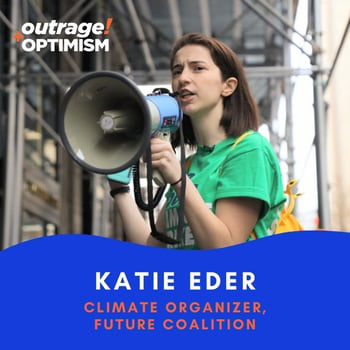 Katie Eder, co-founder and executive director of Future Coalition, says the generation of young people born after Sept. 11, 2001 “shifted how we were raised and the world in which we grew up.”
Katie Eder, co-founder and executive director of Future Coalition, says the generation of young people born after Sept. 11, 2001 “shifted how we were raised and the world in which we grew up.”
Eder credited social media for her generation’s ability to mobilise efficiently, also helping them empathise with people from different backgrounds.
“That awareness comes with a certain responsibility of recognizing that our world and our planet, as we know it, is sort of being destroyed before our eyes,” she tells Outrage + Optimism. “And we can't sit around as a generation and wait for someone else to do something.”
Youth organisers don’t see the environment as a singular issue, Eder says.
“This is a human issue,” she explains. “And we can't talk about climate change without talking about white supremacy. We can't talk about climate change without talking about gender equality. We can't talk about climate change without talking about imperialism.”
“The roots of the climate crisis are the same as the roots of so many other issues,” she continues. “And it comes down to the elite and the wealthy continuing to put power and money over people. Time and time again that has happened.”
For many young climate activists, it’s their own lived experiences that motivates them to fight for systemic change.
“They said, ‘I have to do something, we have to do something about this,’” says Eder. “And so I don’t in any way feel like I am unique within our generation because there are so many of us. There's not just singular leaders that are sort of doing sort of speaking truth to power. It’s a leaderful movement. There are so many young people across countries and communities everywhere that have this passion, have this fire.”
To hear more from Katie Eder, listen to the episode “Building Leaderful Movements with Katie Eder and Guest Co-host Alice Garton.”
Episode Featuring Climate Activist Greta Thunberg
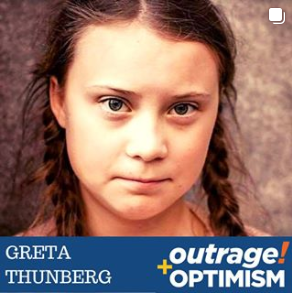 Greta Thunberg, the Swedish environmental activist, became a globally recognised figure when she started protesting outside the Swedish Parliament in 2018, at age 15. Her Friday ‘strikes’ inspired an intergenerational global awakening, with waves of young people across the globe protesting—or at the very least engaging in—perceived inaction by their own national governments. Today the youth-organised movement, Fridays For Future, is well known in hundreds of cities and dozens of countries.
Greta Thunberg, the Swedish environmental activist, became a globally recognised figure when she started protesting outside the Swedish Parliament in 2018, at age 15. Her Friday ‘strikes’ inspired an intergenerational global awakening, with waves of young people across the globe protesting—or at the very least engaging in—perceived inaction by their own national governments. Today the youth-organised movement, Fridays For Future, is well known in hundreds of cities and dozens of countries.
In an interview with Outrage + Optimism co-host Christiana Figueres, Thunberg acknowledges the role previous youth-driven campaigns, such as the March For Our Lives gun-control campaign, played in shaping the Friday strikes.
“Someone said, ‘What if we could do something like that, or stand in the schoolyard or do something for the climate?’” Thunberg recalls.
That the movement was able to quickly spread from Thunberg’s native Sweden to Uganda, Nigeria, Switzerland, Canada, the United States, the UK, Australia and many other nations are a testament to her generation’s ability to speak clearly, confidently, and purposefully on climate change. Not only is this growing movement well educated on climate science, but these groups consistently prioritise equity in everything they do, which speaks volumes about the power of diversity in movements.
In Fridays For Future’s list of demands, climate justice is second only to preventing warming from exceeding 1.5 degrees Celsius above pre-industrial levels.
For activists like Thunberg, there’s also a clear recognition that privilege comes at a cost.
“People in rich countries that already have everything they need to take a few steps back in order to let people in developing countries get a chance to heighten their standard of living,” she says. “Because it's not fair that we have everything, we have caused this problem, and now we are stopping the people in developing countries from living the lifestyle we have lived for [some] time now. That is not fair.”
To hear more from Greta Thunberg, listen to the episode “BONUS: Striking for the Climate with Greta Thunberg.”
Episode Featuring U.S. Climate Activist Isra Hirsi
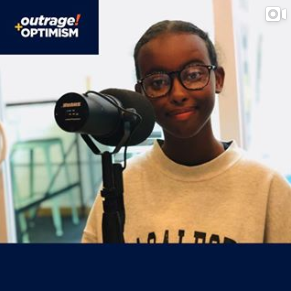 Somali American Irsa Hirsi, the daughter of U.S. Congresswoman Ilhan Omar, started organising because no one else was doing the work in the lead up to a global school strike in 2019.
Somali American Irsa Hirsi, the daughter of U.S. Congresswoman Ilhan Omar, started organising because no one else was doing the work in the lead up to a global school strike in 2019.
Hirsi, the executive director of U.S. Youth Climate Strike, says she joined environmental clubs during secondary school and was often the only person of color attending—a clear signal to her that the people most affected by the climate crisis were not being heard or seen.
“It was really an eye-opener for me because I realised that a lot of these spaces don't talk about the intersection, and they don't talk about Black and Brown people's lives,” she says. “You look at Indigenous folks in my state and all over the country, and you know, they're dying, because their reservations, they're losing clean water, their sacred wild rice beds are being destroyed, and their land was stolen.”
“Climate justice is social justice,” Hirsi adds. “I think the climate crisis is everything. And you know, when you talk about things like racial inequity, or you have things like environmental racism, colonialism, imperialism—they all intertwine. And I don't think people sometimes realize that intersection.”
To hear more from Isra Hirsi, listen to the episode “Climate Justice Is Social Justice.”
Episode Featuring Climate Activist Jerome Foster
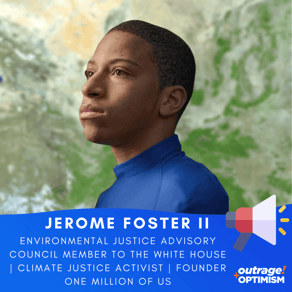 If you need proof that young people can put themselves in a position to make change, look no further than Jerome Foster, founder of the youth advocacy and voting rights group OneMillionOfUs.
If you need proof that young people can put themselves in a position to make change, look no further than Jerome Foster, founder of the youth advocacy and voting rights group OneMillionOfUs.
At only 18 years old, Foster was appointed to the White House Environmental Justice Advisory Council to provide recommendations to address “current and historic environmental injustices.”
By the time he was in secondary school, he was mapping out virtual environments of the climate crisis, showing how it was impacting everything from immigration to gender and race inequality.
“In America, racism is very real,” Foster tells Outrage + Optimism. “A lot of frontline communities that need the money aren't getting it...And they're continually exposed to the climate crisis and not given the infrastructure needed to be able to be resilient from it.”
Instead of mapping out the impacts of climate change, he’s now directly involved in finding solutions to prevent them.
“We can target things from clean technologies to infrastructure and workforce development, to education to urban housing, and have a large purview to make changes,” he says. “So it's just broadening the scope of impact now.”
Foster is also emblematic of the optimism young people hold despite inheriting one of the most profound challenges in human history.
“I'm feeling hopeful when it comes to environmental justice, internationally and nationally. But I think that when we talk about the awakening of what's happening now, it's the fight for coexistence,” Foster says. “A lot of the past 400 to 500 years has been just the siege on coexistence, and a siege on just people being able to live their lives, and being able to express their own cultures in the way that they wanted to. People that were in Africa were expressing their culture the way they wanted to, and then were enslaved, were burned, were targeted, were put in chains for 400 years. And based on that 400-year timeframe, all of our institutions were created: United Nations, the United States, the justice system—everything was built around the idea of hierarchy.”
To hear more from Jerome Foster, listen to the episode “Building a Movement to Fight a System with Jerome Foster
‘No Climate Justice Without Racial Justice’
Episode Featuring UK Member of Parliament, David Lammy
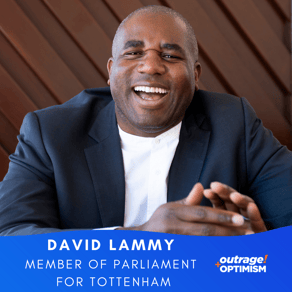 If anyone in British politics can appreciate the long struggle of climate justice, it’s the Member of Parliament (MP) for Tottenham, London, David Lammy, a long-serving Labour Party politician.
If anyone in British politics can appreciate the long struggle of climate justice, it’s the Member of Parliament (MP) for Tottenham, London, David Lammy, a long-serving Labour Party politician.
As he told viewers in his viral TED Talk in October 2020: “I've got to start by admitting that in many ways me giving a talk about how climate action can help Black communities is surprising. I grew up poor and Black with a single mother in Tottenham, one of the most deprived areas in London, in the 1970s and '80s. Climate change was the last thing on my mind. And representing Tottenham as its Member of Parliament for the past 20 years, my focus has been on trying to reduce the deprivation I grew up around.”
While recent events have highlighted the long-standing and pervasive racial inequality crisis in the United States, discrimination on racial, gender and other grounds extends well beyond US borders and has permeated institutions worldwide.
“Black people breathe in the most toxic air relative to the general population,” Lammy says. “We are more likely to suffer from respiratory diseases like asthma. And it is people of colour who are more likely to suffer in the climate crisis. This is no coincidence. The cheapest housing tends to be next to the busiest roads, and many of the lowest-paid jobs are in the most polluting industries. People of colour consistently lie at the bottom of the housing, educational and employment ladders. This story connects Black communities across the world, from London to Lagos to L.A. Black Americans are exposed to 56 per cent more pollution than they cause. White Americans breathe 17 per cent less air pollution than they produce. It gives a whole new meaning to the Black Lives Matter slogan ‘I can't breathe.’”
In an interview with Outrage + Optimism, Lammy repeated similar themes and urged people to recognise that “there can be no climate justice without racial justice.”
That people in low-income and minority communities are experiencing climate impacts more acutely is not an accident, says Lammy, who draws a straight line between European colonialism and the extraction of natural resources to the unfolding emergency.
“If you are marching because of the injustice of the murder of George Floyd, Eric Garner, Trayvon Martin, so many, if you are marching because you're concerned about the way in which the police in Paris or the police in London or the police in Sydney treat Aboriginal people, then understand that you should be marching also for folks in Darfur for where there is a terrible crisis largely driven by the environment and the climate crisis,” he tells Outrage + Optimism.
“And actually, you should care as much about the burning Amazon rain forests, and people losing their homes and communities from Indigenous communities,” he continues. “Those two things go hand in hand. And by the way—because central to those debates, particularly here in Europe, is a debate about colonialism—then also educate yourself and understand that colonialism is absolutely the story of extraction, the story of using Black and Brown people to extract often fossil fuels from the ground is a story of exploitation. And it's at the heart of why we now have this climate emergency.”
To hear more from Labour MP David Lammy, listen to the episode, “Climate Justice and Racial Justice with David Lammy.”
Ecocide: Justice For The Planet
The climate justice movement is not only about correcting injustices directed at marginalised people but also protecting the planet, which has been made more vulnerable by rising carbon emissions and corporate malfeasance.
From deforestation in the tropics, which loses millions of acres in tree cover each year, to oil spills and plastic pollution, the planet itself faces unique threats. While local authorities may have the discretion to charge polluters with environmental crimes, the world lacks an international statute that would serve as a useful deterrent, since so many crimes against nature (which of course, impact on humanity too) take place across national borders.
Jojo Mehta, executive director of Stop Ecocide International (SEI), an organisation she co-founded with the late Polly Higgins, is trying to change that. The organisation is leading efforts for an amendment to the Rome Statute of the International Criminal Court (ICC), which would make ecocide an international crime alongside genocide, crimes against humanity and war crimes. According to SEI, this is the “only global mechanism which directly accesses the existing criminal justice systems of its 123 member states.”
Stop Ecocide defines ecocide as “mass damage and destruction of ecosystems—severe harm to nature which is widespread or long-term.”
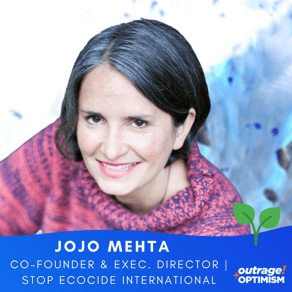 Efforts to hold polluters accountable has been going on for decades, Mehta tells Outrage + Optimism, but that work has mostly occurred behind the scenes. Higgins, who died in 2019, made it her life’s mission to hold corporations criminally liable for environmental crimes. The barrister wrote a book called “Eradicating Ecocide” and was driven by a purpose that made her a beloved figure among conservationists.
Efforts to hold polluters accountable has been going on for decades, Mehta tells Outrage + Optimism, but that work has mostly occurred behind the scenes. Higgins, who died in 2019, made it her life’s mission to hold corporations criminally liable for environmental crimes. The barrister wrote a book called “Eradicating Ecocide” and was driven by a purpose that made her a beloved figure among conservationists.
“Our basic human right is the right to life,” says Mehta. “But what protects that right is the fact that killing each other is a crime. So murder is a crime, and that protects our right to life. And so [Higgins] then realised that the criminal law is actually the protective side of law. And when she started investigating, she found that when the International Criminal Court first came into existence, and the draft of the Rome Statute, which governs that court, was being discussed, there was originally a clause in that draft to cover serious environmental destruction and that it never made the final cut.”
In 2020, the Stop Ecocide Foundation convened a 12-member panel of leading legal experts to create a legal definition of ecocide that could serve as the basis for its proposed amendment to the Rome Statute.
As the Stop Ecocide Foundation wrote in its introduction outlining the panel’s work: “Proceeding to agree a crime of ecocide could contribute to a change of consciousness, in support of a new direction, one that enhances the protection of the environment and supports a more collaborative and effective legal framework for our common future on a shared planet. It offers a new and practical legal tool.”
Mehta credits environmental organisers and activists for raising public consciousness and allowing conversations around ecocide, and other major climate-related issues that historically took place in the background, to break through.
“I think one of the things that's one of the key factors behind the acceleration of this movement to criminalise ecocide has been the climate mobilization of getting the people coming onto the streets, whether that's Extinction Rebellion, or whether it's Greta Thunberg inspiring the school strikes,” Mehta says. “Those grassroots movements, and those disruptions at the street level, have absolutely been key for us, because what they've done is they've created a level of disruption and polarisation that's opened up a window of conversation in the media and in political life, which has meant that what we've ultimately been saying for years is now finally being heard. And so there is a very direct correlation between those two things.”
To hear more about efforts to make ecocide an international crime, listen to the episode, “Jojo Mehta on Ending Ecocide and Impunity.”
While legislation is key to addressing the climate crisis, organizations are also turning to litigation to hold polluters accountable. According to a United Nation Environment Programme report on climate litigation, there were 1,550 climate cases across 38 countries globally as of July 1, 2020, representing a two-fold increase from 2017, the last time the agency released such a report. Broad-based climate litigation has played a key role in the global effort to keep warming below 2 degrees Celsius.
“The amount of climate change litigation is increasing, the range of legal theories is expanding, and it has become clear that climate cases can contribute in meaningful ways to compel governments and corporate actors to pursue more ambitious climate change mitigation and adaptation goals,” the report said.
One of the most effective climate litigators in the world is James Thornton, CEO of Client Earth, a UK-based environmental law charity.
Thornton tells Outrage + Optimism that along with using the courts to prevent new coal-fired power plants, for example, Client Earth also works with governments to write legislation to “create better legal systems.”
“The Paris Agreement is very beautiful. And it hasn't yet fully cascaded down into national laws. So it hasn't fully cascaded into the laws of every country, that needs to happen,” Thornton says. “And those laws in every country need to also apply to every sizeable company in the country. So that every company needs to have a Paris-compliant business plan.”
Client Earth was instrumental in stopping three dozen planned coal-fired power plants in Poland from being built, either because environmental impact assessments were insufficient or the plants were proven to be harmful to the planet. In one case, Client Earth purchased shares of one such company and sued the officers and directors for failing to fulfill their fiduciary duties to its shareholders. Client Earth proved that coal was a bad investment and won the case, proving that climate litigation doesn’t have to be siloed around environmental law.
According to the UN report, cases are increasingly centred around climate rights, domestic enforcement, keeping fossil fuels in the ground, corporate liability and responsibility, impacts of adaptation and greenwashing.
Dr. Tara Shine, an environmental scientist and former member of the United Nations Framework Convention on Climate Change Group of Experts, says broad-based efforts to tackle climate change through the courts can have a significant impact.
“I have had this awakening about the power of the rule of law,” she says on Outrage + Optimism. “Whether that law sits in human rights, or environment, or in labour law, or investor law, it is all there for us to hold those who seek to do wrong, who seek to cause injustice, to account. And that way environmentalists working with clever lawyers can really do amazing things.”
To learn more about James Thornton’s career and climate litigation efforts, listen to the episode, “Taking Dirty Energy To Court with James Thornton and Dr. Tara Shine.”
Recap
As you listen to these featured podcast episodes, we hope you develop a sense of outrage and a strong sense of determined optimism. While we should all be incensed by the continued treatment of Black, Brown, Indigenous and all marginalised groups, we should also be equally outraged that people living in developing countries and small island states bear the brunt of the climate crisis simply because of wealthier countries’ insatiable appetite for burning fossil fuels. We should collectively empathise with the millions of young people who’ve inherited a planet teetering on the edge of calamity, simply because previous and current generations have turned a blind eye to ecological destruction.
But there’s also a great deal to be optimistic about. Consider the energising, unrelenting, and exuberant youth climate movement that has swept the world in such a short period. While Thunberg may have been the original voice of the movement, there are countless young people from many backgrounds confronting the crisis head on and declaring, “No more!” to myriad problems, including racial, economic and gender inequalities. One such example is the brilliant Luisa Neubauer, who is amongst youth leaders in Germany speaking truth to power.
In an interview with Outrage + Optimism, Luisa says climate inaction is affecting young people’s outlook on their future, potentially with devastating consequences. Citing a recent study involving 10,000 young people across 10 countries, Neubauer says nearly three-quarters of youth feel “their future is being stolen, that their future is scary and that their governments are failing them.”
“And so there is a huge sense of betrayal among young people especially,” she adds. “And what we're seeing is also that this doesn't just affect their well being, but it also affects life choices,” noting that four in 10 youth are hesitant about having children of their own in the future due to climate impacts.
One way to change people’s perspective is by educating them about successful social movements throughout history that prevailed despite dim odds.
“I think what is empowering is ultimately not the climate knowledge alone, but the climate knowledge, combined with the knowledge of social change-making,” Neubauer says.
Young people like Neubauer are not only fighting for the planet but the futures of so many others—a future in which children no longer have to breathe in poisonous air as they play in the schoolyard, a future in which Indigenous land is protected, and a future in which citizens of developing nations aren’t suffering the consequences of the environmental pollution of wealthier nations.
Perhaps no one encapsulates the awesome responsibility we all have to this Earth more than Sir David Attenborough, the famed broadcaster who has spent decades documenting the beauty of our natural habitats. Attenborough, appearing on our premiere episode of Outrage + Optimism, says there’s a “profound moral reason” for all of us to protect the planet and all its inhabitants.
“It's a morality that concerns all of the animals and plants that exist in this world, which are a result of three and a half billion years of evolution,” he explains. “And that one generation should come along and think it has the right to maltreat it to the extent that it obliterates great sections of it, is to me insupportable. It's not a question of argument or calculating how bad or un-bad it is, it's just a moral issue. We have an obligation on our shoulders. And it would be to our deep, eternal shame if we fail to acknowledge that.”
To hear more from Sir David Attenborough and our moral responsibility to the planet, listen to the episode, “The Power of Outrage and Optimism with David Attenborough.”
